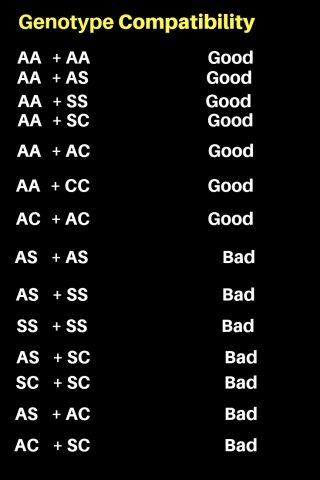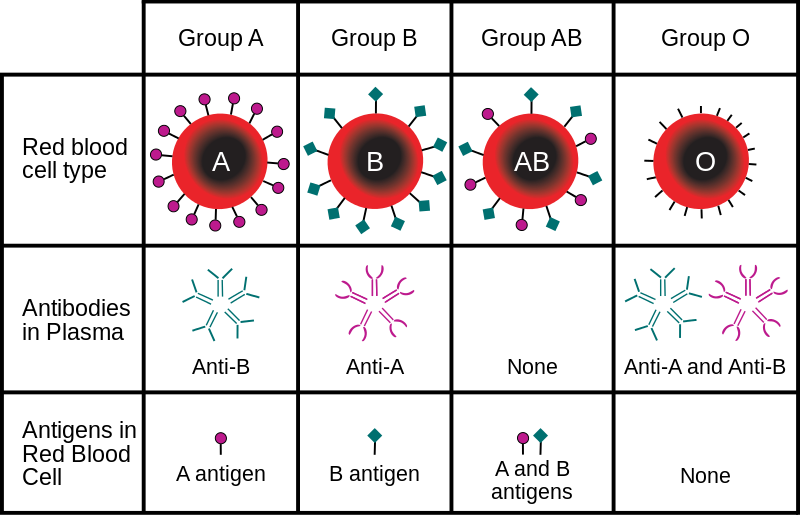With about 100,000 U.S. pupils alone living with sickle cell disease as of 2008, some intending couples still get married without knowing their blood group and genotype compatibility.
You must know your blood type and genotype to avoid hemolytic anaemia and other blood-related diseases.
In this article, you will know the list of genotypes and their blood group compatibles.
But before diving into which genotypes are compatible, it is crucial that you first understand genotype definition.
Table of Contents
What is Genotype?
A genotype is the genetic composition of an organism. It is the sum of all the traits/genes you inherited from your parents. It is localized inside the chromosome of the nucleus.
Types of Genotype in Humans.
There are six types of genotype in existence, and every human being carries a pair of haemoglobins. They are distinguished by the alleles they carry. The list of genotypes is as follows.
- Genotype: AA
- AS genotype
- Genotype: AC
- SS Genotype
- Genotype: SC
- Genotype: CC
SS genotype and AC are abnormal genotypes that cause sickle cell anaemia or thalassemia diseases.
Blood Group and Genotype Compatibles
Summary of blood types and their genotype, antigen, and antibody.
- Blood type A has genotype AA or AO, antigen A in red blood cells and antibody B in plasma cells.
- Blood group B has BB or BO genotype, antigen B in the red blood cells and an antibody in the plasma.
- AB blood group has AB genotype, antigen A and B and no antibodies.
- O blood group has an OO genotype, no antigens but has A and B antibodies in the plasma.
Rhesus factor (Rh) is an inherited protein substance found on the surface of red blood cells. Those that have the protein on the surface of their blood are Rh-positive, while those without protein are Rh-negative.
Rh-positive is more common than Rh- and is never a sickness if you are Rh-positive or negative. However, a problem arises when the Rh of the mother differs from that of her baby (Rh incompatibility).
If maybe during delivery or you experienced bleeding during pregnancy and your blood came in contact with that of your baby, your body would produce Rh antibodies.
These antibodies will not cause any problems in your first pregnancy but can affect your subsequent pregnancies if you and your baby’s Rh factor are incompatible.
Rh antibodies may cross the placenta and damage the red blood cells of the baby, causing life-threatening anaemia.
It is always advisable for pregnant mothers to register for antenatal so they will check the Rh status of their unborn baby for compatibility.
If their Rh is different, an Rh immune globulin injection will be given to the woman before delivery, to prevent her body from producing Rh antibodies. (4)
How to Know Your Genotype Without a Blood Test
The only reliable way to know your genotype without a blood test is when both of your parents are AA; then your genotype will be AA.
However, it is always advisable to go for your genotype testing in at least two different hospitals to be sure of your results.
Which blood group and genotype are the best?
Except for the SS and AC genotype that causes thalassemia, or blood-related sickness, all the other genotypes are suitable. They have both advantages and disadvantages. For example, someone with genotype AA can marry anybody, even someone with SS genotype, but they are more prone to malaria sickness.
Someone with AS genotype cannot marry SS or AC, but their blood is more resistant to malaria. So, all the blood types and genotypes are suitable provided they are compatible.
Bottom line
Sickle cell anaemia is real; intending couples should always go for a genotype test to confirm their blood group compatibility before getting married. Help us reduce the level of blood-related diseases today. Always remember that prevention is far better than cure.

